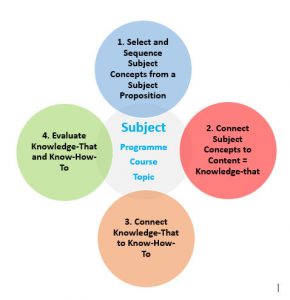A small group of academics at the bottom of the world in Aotearoa New Zealand have been beavering away for 11 years concerned with the idea of what knowledge counts in education. This issue of what knowledge should be taught in educational institutions has become a key research programme internationally among realist sociologists of education and the purpose of the Knowledge in Education Research Unit (KERU) is to ensure New Zealand’s involvement in this programme. Our aim is to provide research for policymakers and teachers in order to strengthen the argument for the place of disciplinary-derived knowledge in the curriculum. Our argument is that students from all socio-economic and ethnic backgrounds should have access to the type of knowledge that leads to success at school (e.g. McPhail & Rata, 2019). KERU is committed to improving educational results for Māori and Pacific students and children from low socio-economic communities.
We have been a productive unit with our leader Professor Elizabeth Rata and myself publishing regularly and widely (see here). Established in 2010, KERU is based in the School of Critical Studies, Faculty of Education and Social Work at the University of Auckland but includes researchers from across the Faculty. Our theoretical approach is derived from Durkeimian and Bernsteinian traditions using realist methodological approaches (Lourie & Rata, 2017; McPhail & Lourie, 2017; Rata, 2014) . The focus is on types of knowledge in the curriculum and the connection between curriculum design and progressive pedagogies. In addition to promoting research-based educational interventions, KERU provides a vehicle for postgraduate students and contributes to research at the University of Auckland.
We have had a particularly fruitful collaboration exploring knowledge-based approaches to the curriculum and learning with Dr Richard Pountney, Principal Lecturer and Teaching Fellow at the Sheffield Institute of Education (SIOE), Sheffield Hallam University. Since 2015 the two universities have built a sound research collaboration through ongoing knowledge exchange activities. These include symposia by Richard Pountney (SIOE) in Auckland and by KERU’s Graham McPhail and Elizabeth Rata in Sheffield. The co-authored papers and co-research projects in United Kingdom and New Zealand schools have been generative (Pountney & McPhail, 2017, 2019) and have contributed to the model for teacher professional development (see below) which is being used with pre-service and practising teachers in New Zealand and in England by Di Swift at the Keele and North Staffordshire Teacher Education (KNSTE) unit.

Our most recent work has been centred on the Curriculum Design Coherence Model (CDC Model) and Richard Pountney’s humorous and pithy phrase ‘driving my students to abstraction’ (see blogpost Waving not Drowning) sums up the essence of the Model. Abstraction lies at the heart of creative thinking and deep learning and so is central to the model. We argue the development of abstract thought comes from using disciplinary-derived concepts, so concepts rather than content should be the starting point for curriculum design (download CDC Model Short Outline Feb 2021)
The CDC Model aims for deep learning by placing disciplinary-derived concepts (or subject concepts for short) at the center of the design process. Subject concepts are identified by ‘surfacing’ the epistemic structure of a lesson, topic, or learning programme. Sufficiently abstract subject concepts are powerful tools for learning because of their generalisability. The subject concepts also act as cohering mechanisms as conceptual and applied knowledge are brought together by being linked to subject content. The Model is designed as a series of four sequential Elements but the design process is iterative, a movement back and forth between (i) selecting and sequencing subject concepts, (ii) connecting subject concepts to content, (iii) connecting ‘knowledge-that’ (concepts and content) to ‘know-how-to’ (applied knowledge) and finally (iv) evaluating the knowledge-that and know-how-to. The essence of the lesson, topic, or programme is encapsulated in a proposition that claims what the nature of the relationship is between the topic and the key concepts (see my video Curriculum Design for Deep Learning)
We consider the model particularity important because of the context in which teachers work in New Zealand with a high degree of design autonomy. This is also an international challenge as curriculum specification worldwide has become more generic and less specific in nature. The CDC model has been developed in response to the growing expectation that teachers will be capable of designing for the ‘deep learning’ demanded for future-focused or 21st C education. The focus of our 11th symposium at the end of last year was on how the CDC Model can be applied to Initial Teacher Education. Watch this space for upcoming publications.
Emeritus Professor Michael Young was the inaugural visitor in 2010 and encouraged the formation of KERU. Since that time we have been visited by Professors Joe Muller, Leesa Wheelahan and Karl Maton, and Chris Corbel and Richard Pountney. Richard was to be with us again in New Zealand but sadly due to the Covid pandemic we will be holding the 11th symposium without him as our international guest. We are certainly together in spirit as we work to deepen our knowledge of knowledge and share our findings internationally.
References
Lourie, M., & Rata, E. (2017). Using a realist research methodology in policy analysis. Education Philosophy and Theory, 149 (1), 17-30. http://dx.doi.org/10.1080/00131857.2016.1167655
McPhail, G. (2020). Twenty-First Century Learning and the Case for More Knowledge About Knowledge. New Zealand Journal of Educational Studies. doi:10.1007/s40841-020-00172-
McPhail, G., & Lourie, M. (2017). Getting Real: Is Realism a Blind Spot in Research Methodology?. New Zealand Journal of Educational Studies, 52(2), 285-299. doi:10.1007/s40841-017-0087-y
McPhail, G., & Rata, E. (2019). The knowledge democracy connection and music education. Philosophy of Music Education Review, 27(2), 112-132. doi:10.2979/philmusieducrevi.27.2.02
Pountney, R., & McPhail, G. (2019). Crossing boundaries: Exploring the theory, practice and possibility of a ‘Future 3’ curriculum. British Educational Research Journal, 45(3), 483-501. doi:10.1002/berj.3508
Pountney, R., & McPhail, G. (2017). Researching the interdisciplinary curriculum: The need for ‘translation devices’. British Educational Research Journal, 43(6), 1068-1082. doi:10.1002/berj.3299
Rata, E. (2014). The Three Stages of Critical Policy Methodology: an example from curriculum analysis. Policy Futures in Education, 12(3), 347–358.
CDC Model Reading
McPhail, G. (2020). The search for deep learning: a curriculum coherence model. Journal of Curriculum Studies. doi:10.1080/00220272.2020.1748231
Rata, Elizabeth (2021) Context and Implications Document for: The curriculum design coherence model in the knowledge-rich school project, Review of Education, https://bera-journals.onlinelibrary.wiley.com/doi/10.1002/rev3.3253
Rata, Elizabeth (2021) The Curriculum Design Coherence Model in the Knowledge-Rich School Project, Review of Education, https://bera-journals.onlinelibrary.wiley.com/doi/full/10.1002/rev3.3254
Rata, E. (2019) Knowledge-rich teaching: A model of curriculum design coherence, British Educational Research Journal, 45(4), 681–697. https://doi:10.1002/berj.3520.
Rata, E. (under review). Virtual Conversations: Provocations for Aotearoa New Zealand 2020. New Zealand Annual Review of Education.
Rata, E., & McPhail, G. (2020). Teacher Professional Development, the Knowledge-Rich School Project and the Curriculum Design Coherence Model. In J. Fox, C. Alexander, & T. Aspland (Eds.), Teacher Education in Globalised Times: Local Responses in Action (pp. 311-329). Singapore: Springer. doi:10.1007/978-981-15-4124-7_1
